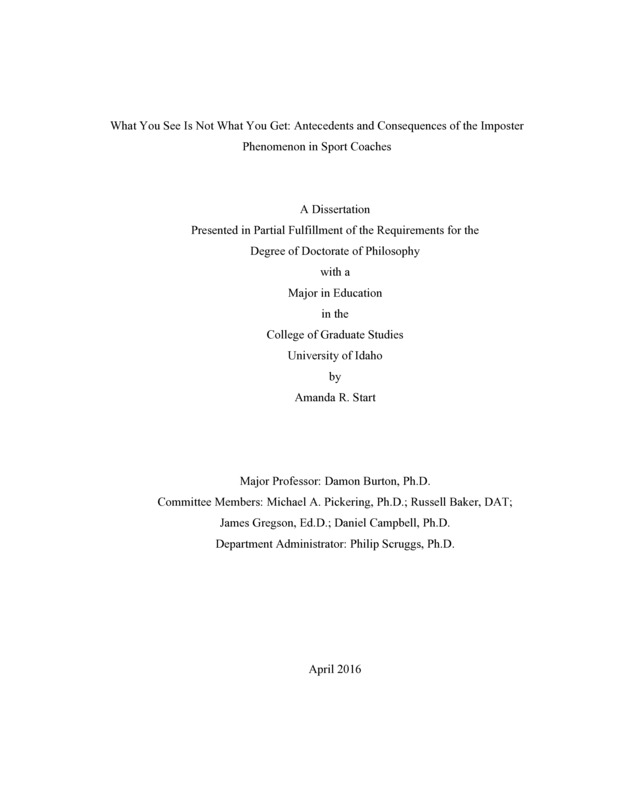What You See Is Not What You Get: Antecedents and Consequences of the Imposter Phenomenon in Sport Coaches
Start, Amanda. (2016). What You See Is Not What You Get: Antecedents and Consequences of the Imposter Phenomenon in Sport Coaches. Theses and Dissertations Collection, University of Idaho Library Digital Collections. https://www.lib.uidaho.edu/digital/etd/items/start_idaho_0089e_10820.html
- Title:
- What You See Is Not What You Get: Antecedents and Consequences of the Imposter Phenomenon in Sport Coaches
- Author:
- Start, Amanda
- Date:
- 2016
- Keywords:
- burnout coaches engagement implicit theories of ability imposter phenomenon perfectionism
- Program:
- Movement & Leisure Sciences
- Subject Category:
- Psychology
- Abstract:
-
The imposter phenomenon (IP) refers to an experience of self-perceived intellectual phoniness (Clance & Imes, 1978). Imposters believe they are frauds, having fooled people around them into believing they are more capable than they actually are (Clance, 1985). Three separate but related studies were conducted to investigate the measurement, prevalence, antecedents, and consequences of imposter phenomenon in a large, convenience sample of sport coaches. Study 1 developed and validated the Imposter Phenomenon Scale (IPS). Initial evidence suggested the IPS was a valid and reliable measure of imposter feelings, although additional work will need to be done to refine the instrument. A two-factor (i.e., Self-Perceptions of Fraudulence and Concerns about Others’ Perceptions of My Success), seven-item instrument emerged from exploratory and confirmatory factor analyses, and based on Cronbach’s alpha, the items within each hypothesized dimension were similar and closely related. Following the psychometric validation of the IPS, Studies 2 and 3 assessed the nature of IP in sport coaches. Study 2 estimated the prevalence of IP in sport coaches and examined key demographic and background correlates of IP. Less than 12% of coaches in this convenience sample reported that they were experiencing imposter feelings. Imposters in this sample tended to be female, white, and less experienced as a coach and as an athlete, to have coached and competed at lower competitive levels, and to have had less training and no coaching mentor, but these variables accounted for a minimal amount of the variance in IP. Finally, Study 3 examined possible motivational antecedents and consequences of IP in coaches. Two full latent variable (FLV) models were assessed—one model predicting burnout and one model predicting engagement. In each model, implicit theories of ability were predictor variables, and perfectionism and IP were mediator variables, mediating the relationships between implicit theories and burnout and between implicit theories and engagement. The hypothesized FLV models were near estimations of the observed relationships among implicit theories, perfectionism, IP, burnout, and engagement in this sample of coaches, although support for the hypothesized models could only be cautiously concluded. Results were discussed in light of limitations and future directions.
- Description:
- doctoral, Ph.D., Movement & Leisure Sciences -- University of Idaho - College of Graduate Studies, 2016
- Major Professor:
- Burton, Damon; Pickering, Michael A
- Committee:
- Baker, Russell; Gregson, James; Campbell, Daniel
- Defense Date:
- 2016
- Identifier:
- Start_idaho_0089E_10820
- Type:
- Text
- Format Original:
- Format:
- application/pdf
- Rights:
- In Copyright - Educational Use Permitted. For more information, please contact University of Idaho Library Special Collections and Archives Department at libspec@uidaho.edu.
- Standardized Rights:
- http://rightsstatements.org/vocab/InC-EDU/1.0/

